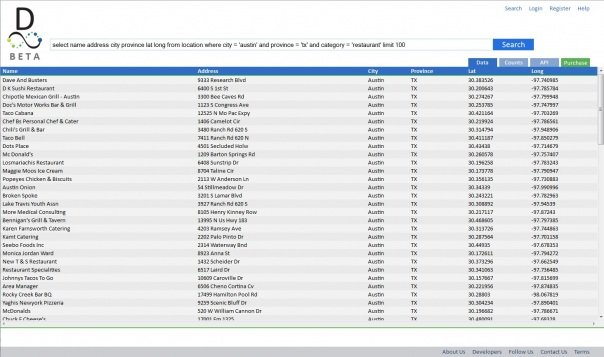There’s a lot of talk about the democratization of data, but simply making data sets publicly available leaves unresloved a couple of key problems. One is that users have to know the data is available, and the other is they have to know how to work with it to get the information they want. Austin, Texas-based startup Datafiniti is looking to change that with a search engine that it hopes will make finding relevant data as easy as finding relevant web sites using Google.
Datafiniti’s web-based service is as simple as entering SQL parameters into a search box, clicking “search” and watching the results display. The interface even suggests relevant search terms as users type, based on the categories of data available in the Datafiniti platform and the different fields by which it’s sorted. Once users have the information, they can use the supplied API to feed their application with the information, or they can export it as CSV files or JSON objects.

The service is pretty clearly targeted at developers wanting to build data-centric web applications and, as founder and CEO Shion Deysarkar explained to me, Datafiniti tries to differentiate itself with the aforementioned API. Users get just one API that offers up access to multiple data types, which contrasts with the traditional mashup experience of using a different API for each data source.
As of a couple weeks ago, Deysarkar told me Datafiniti consisted of about 15 million records, but it’s constantly growing and his goal is to index “any and all structured data on the web.” Datafiniti launched today with five available data types — Location, Social or Identity, Product, News and Real Estate — but Deysarkar said there will be many more to come.
Jeff Ferries, Datafiniti’s VP of sales, told me that Datafiniti also targets business users. Firms such as Dun Bradstreet, Axciom and Experian, he explained, are limited in the types of data they can compile, and they usually can only add data monthly as their source material is updated. Deysarkar said that process, which involves opening a physical catalog, flipping through listings and calling a broker, is “pretty ridiculous,” especially considering that data might be out of date by the time it’s complete.
If Deyasarkar’s name sounds familiar, that’s because he’s the founder of 80legs, a high-powered web-crawling service whose launch my colleague Stacey Higginbotham covered in 2009. 80legs as a company no longer exists, but the service powers Datafiniti by constantly crawling the web and adding new data, and it’s still available as a product from new parent company Datafiniti.
The image above shows a search string for restaurants located in Austin and its results, but this video offers a more-thorough walkthrough of the Datafiniti experience.
Related research and analysis from GigaOM Pro:
Subscriber content. Sign up for a free trial.
- What Amazon’s new Kindle line means for Apple, Netflix and online media
- NewNet Q2: Google closes the quarter with a bang
- From car to cloud: the future of the in-vehicle app landscape
Article source: GigOM http://feedproxy.google.com/~r/OmMalik/~3/xO8HZPSIMlw/